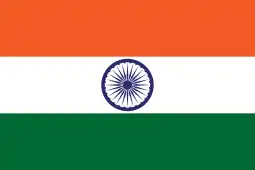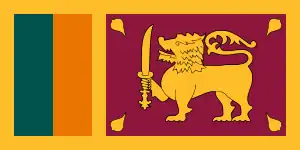Nehru-Kotelawala Pact
The Nehru-Kotelawala Pact was an agreement that was signed between Jawaharlal Nehru, the Prime Minister of India, and John Kotelawala, the Prime Minister of Sri Lanka, on 18 January 1954.[1][2] It was an agreement in regarding to the status and future of people of Indian origin in Ceylon. They were brought by British from Madras Presidency in British India to work in tea, coffee and coconut plantations of British Ceylon.[3]


In the pact, India accepted in principle the repatriation of Indian population in Ceylon. But Jawaharlal Nehru only supported voluntary repatriation of those who voluntary accepted Indian citizenship.[4][5] India disagreed on Sri Lankan position that suggested granting Indian citizenship to people, who failed to qualify for Sri Lankan citizenship.[6]
See also
- Ceylon Citizenship Act, 1948
- Bandaranaike–Chelvanayakam Pact, 1957
- Sirima-Shastri Pact, 1964
- Sirima-Gandhi Pact, 1974
References
- Rajasingham, K T (17 November 2001). "Sri Lanka: The untold story". Asia Times Online. Archived from the original on 2002-02-08. Retrieved 15 March 2015.
{{cite web}}: CS1 maint: unfit URL (link) - Dhanapala, Jayantha (11 December 2015). "The Foreign Policy of Sirimavo Bandaranaike". The Island (Sri Lanka). Retrieved 15 March 2015.
- "The Foreign Policy of Sirimavo Bandaranaike – RELATIONS WITH INDIA". infolanka.asia. Retrieved 15 March 2015.
- The Eastern Economist; a Weekly Review of Indian and International Economic Affairs. 1962. p. 712. Retrieved 3 June 2016.
- World Focus. Hari Sharan Chhabra. 1996. p. 51. Retrieved 3 June 2016.
- Bibin, Thomas. "Statelessness abolished?". Cope. Archived from the original on 13 August 2014. Retrieved 15 March 2015.
Further reading
- Palanithurai, Ganapathy (1993). Dynamics of Tamil Nadu Politics in Sri Lankan Ethnicity. Northern Book Centre. p. 120. ISBN 9788172110406.
- Jeyaratnam Wilson, A (1994). S.J.V. Chelvanayakam and the Crisis of Sri Lankan Tamil Nationalism, 1947-1977: A Political Biography. C. Hurst & Co. Publishers. p. 149. ISBN 9781850651307.